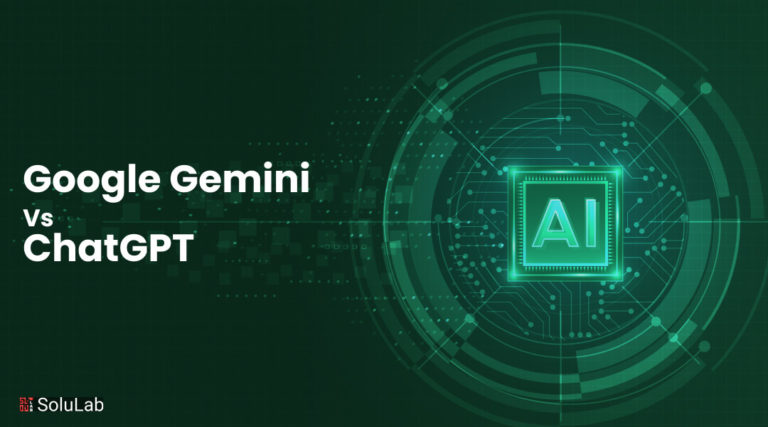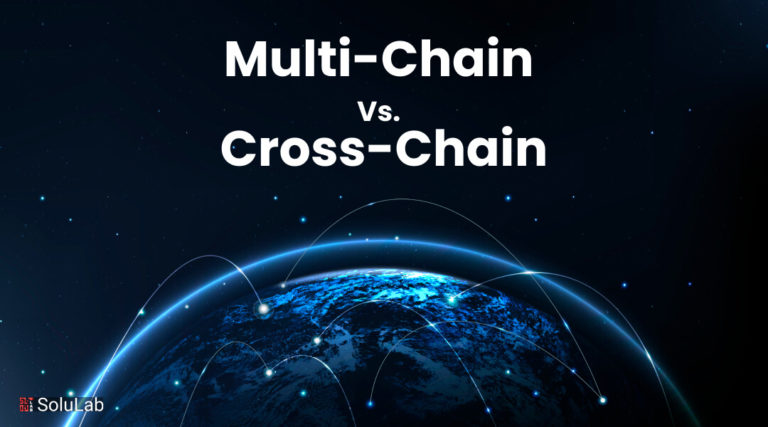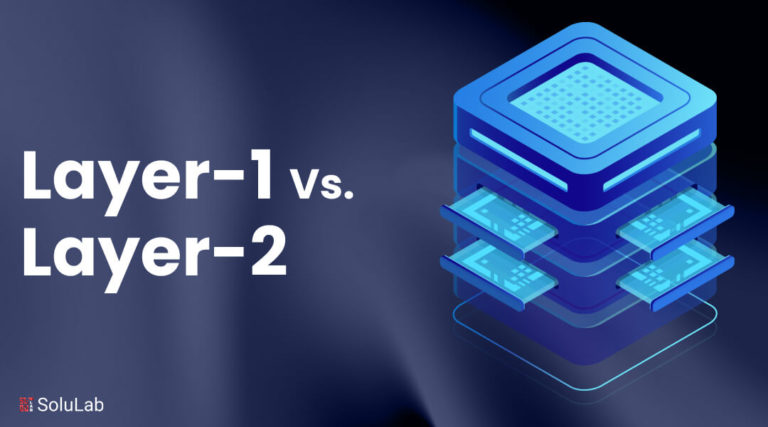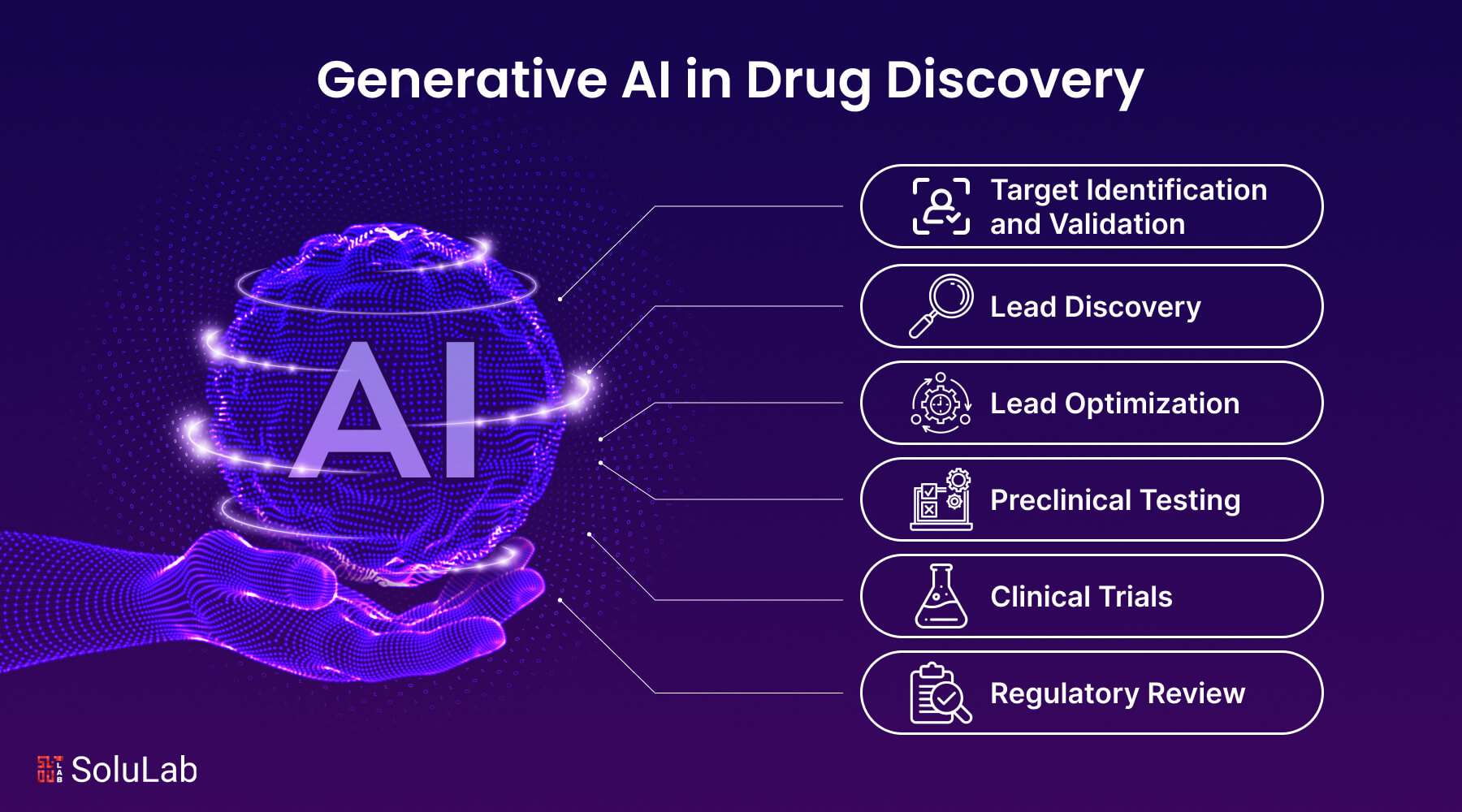
An advanced branch of artificial intelligence (AI) called generative AI is having a big influence on the drug development industry. In the past, finding new medications has been a difficult and expensive process that involves carefully going through large chemical libraries to find molecules that are both feasible for treating and preventing diseases.
The expected significant rise in the worldwide market value of generative AI for drug discovery is indicative of its increasing significance. It is anticipated to grow from USD 126.07 million in 2022 to a projected USD 1,417.83 million by 2032, indicating a constant Compound Annual Growth Rate (CAGR) of 27.38% from 2023 to 2032, based on Precedence Research.
In this blog, we will explore how generative AI in drug discovery accelerates the development process, looking at its uses, effectiveness, and the exciting prospects it presents for creating innovative medications.
What Part Does Generative AI Play in Each Phase of the Drug Discovery Process?
From pre-market research to post-market monitoring, generative AI has a substantial impact on every stage of the drug discovery process, increasing efficacy and efficiency.
- Target Identification and Validation: To find and confirm putative molecular targets linked to illnesses, generative AI initially analyzes enormous volumes of biological and clinical data. It offers crucial insights for focusing on disease processes by forecasting the roles and interconnections of genes, proteins, and pathways.
- Lead Discovery: Artificial intelligence models such as GANs and RNNs develop by producing new chemical structures throughout this process. By foretelling their binding affinities and pharmacological characteristics, they expedite the identification of lead compounds and simplify the process of choosing potential candidates.
- Lead Optimization: Artificial intelligence (AI) helps optimize lead compounds by suggesting chemical changes that improve therapeutic efficacy and safety. Through this procedure, medication candidates are improved pharmacologically and possible negative effects are minimized.
- Preclinical Testing: To evaluate toxicity, safety, and efficacy, generative AI analyzes enormous datasets. It lessens the need for intensive in vitro and in vivo testing by forecasting side effects and treatment outcomes.
- Clinical Trials: AI is essential to the planning and conduct of clinical studies. It improves trial methods and examines patient data to find potential trial candidates. During studies, real-time data analysis is helpful in identifying safety concerns and effectiveness patterns.
- Regulatory Review: AI streamlines the processing of complicated data for regulatory submissions, guaranteeing thorough and precise evaluation for medicinal approvals.
Use Cases of Generative AI in Drug Discovery
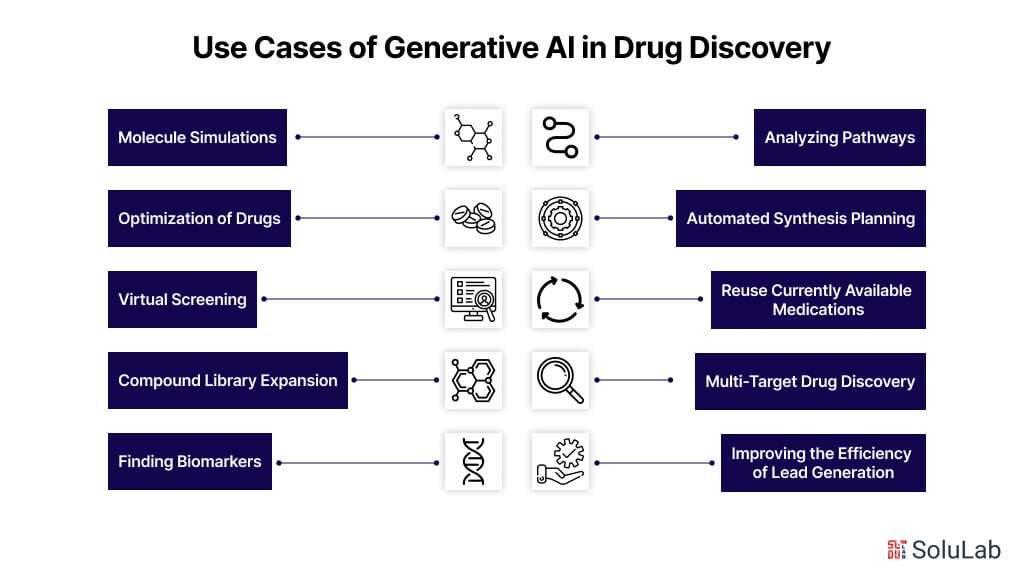
Drug discovery can be greatly impacted by generative AI as it can speed up and improve the process. Generative AI applications in drug discovery include the following:
1. Molecule Simulations
Novel chemical compounds and molecular structures can be produced via generative AI. Known as in silico testing, generative AI plays a key role in reducing the need for physical testing of potential therapeutic compounds by enabling high-precision chemical simulations to be carried out fully on computers. By accurately predicting and evaluating molecular interactions, behaviors, and binding affinities, this testing enhances the process of evaluating possible therapeutic options.
The high expenses connected with conventional laboratory-based chemical investigations are reduced by using this method. Through the precise prediction of molecular interactions and behaviors, generative artificial intelligence (AI) enables researchers to evaluate potential compounds quickly and thoroughly, eliminating the need for costly and time-consuming physical testing and speeding up the drug development process.
2. Optimization of Drugs
Generative AI drugs significantly contribute to enhancing existing drug compounds by suggesting precise modifications to drug molecules. This innovative AI technology aims to enhance the therapeutic effectiveness, safety profiles, and various pharmacological properties like solubility and binding affinity of medications.
By utilizing generative AI, drug development processes are streamlined, reducing the significant time and resources typically involved in drug optimization. Researchers can efficiently explore numerous modifications suggested by generative AI drugs to identify the most promising enhancements, thus accelerating the journey towards improved medications and potentially mitigating the risks associated with new drug development.
3. Virtual Screening
Generative AI in medicine significantly enhances virtual screening. It swiftly identifies possible drug candidates by modeling their interactions with target proteins using computer tools. By using machine learning models for forecasting a molecule’s bioactivity, generative AI improves the virtual screening process and allows researchers to carefully assess and filter a wide range of molecules for possible biological activity against the target without requiring physical experiments.
The efficiency of the drug development process is increased by this AI-enhanced method, which enables the quick identification and rejection of less promising candidates, saving a significant amount of time and money. Moreover, it increases the likelihood of discovering powerful and efficient compounds deserving of additional research and testing confirmation, guaranteeing a more targeted and strategic advancement in the drug discovery pathway.
4. Compound Library Expansion
By recommending analogs and derivatives of known compounds inside the library, generative AI helps significantly in the expansion of compound libraries in drug discovery. Through the use of machine learning algorithms and the analysis of structure-activity correlations (SAR) in current molecules, generative AI is able to forecast alterations that might improve desirable attributes like safety or efficacy.
These proposed modifications yield a variety of molecular configurations that expand the chemical library. In order to find possible drug candidates or improve lead compounds, researchers may then synthesize and test these newly created compounds, which will save time and money in the drug development process. This method’s iterative nature enables the chemical library to be improved and refined over time, ultimately assisting in the search for potent medicinal molecules.
5. Finding Biomarkers
Artificial intelligence (AI) algorithms are used in biomarker discovery to search through large datasets, such as proteomics and genomics data, for possible biomarkers linked to certain diseases or disorders. Particular molecular signs known as biomarkers can indicate the existence, course, or severity of an illness.
Finding these biomarkers is essential for accurate diagnosis, patient categorization, and medication development target selection. Generative AI is a useful tool for improving our understanding of illnesses and accelerating the development of customized therapies because of its capacity to handle complicated biological data effectively and identify subtle correlations.
6. Analyzing Pathways
For drug development and molecular biology pathway analysis, Generative AI is a useful tool. It helps scientists forecast how proteins will interact with one another and decipher intricate biological circuits.
Artificial Intelligence improves our knowledge of disease processes at the molecular level by modeling these interactions. With a better understanding of the pathways, researchers can find possible places of intervention where medications or other treatments can target and modify the pathways, leading to the eventual advancement of disease-specific therapy development. This method works especially well for finding new therapeutic targets and refining drug development plans.
7. Automated Synthesis Planning
By anticipating the most effective chemical reactions and paths to create a desired molecule, artificial intelligence (AI) can help design the synthesis of novel molecules. Artificial intelligence (AI) can forecast the most effective reaction paths for the synthesis of certain chemicals by using pattern recognition to optimize reactant ratios, temperature, and pressure.
Time and resources are saved as a result of the drug research and materials development processes being accelerated. AI-driven technologies may also suggest new chemical structures, which can help create unique substances with desired features. Artificial Intelligence (AI) in chemistry has the potential to accelerate the synthesis of novel compounds and streamline research.
8. Reuse Currently Available Medications
AI can extend the therapeutic efficacy of well-known chemicals, discover new uses for already-approved medications, and discover new uses for current ones. With the use of sophisticated algorithms and data analysis, AI is able to comb through enormous databases and reveal hidden connections between medications and illnesses. This methodology expedites the identification of plausible therapeutic interventions and extends the use of established substances beyond their initial intended purposes.
AI can effectively anticipate medication interactions, side effects, and efficacy by utilizing machine learning, which offers researchers and physicians insightful information. In the end, this creative use of AI may expedite medication development procedures and aid in the identification of more potent and varied therapy alternatives.
9. Multi-Target Drug Discovery
With its capacity to analyze enormous datasets, anticipate chemical interactions, and target various biological pathways linked to complicated illnesses like cancer, artificial intelligence (AI) is able to develop molecules. These AI-created drugs demonstrate a polypharmacological strategy by hitting many molecular sites at once, boosting their effectiveness, and maybe getting beyond resistance mechanisms.
This method enables a more thorough and individualized treatment plan by customizing the therapeutic intervention to each patient’s unique molecular details. AI’s adaptability in traversing the intricate world of biological interactions speeds up drug discovery and makes it easier to design novel, synergistic combinations that have the potential to completely change the way complex illnesses like cancer are treated.
10. Improving the Efficiency of Lead Generation
AI-driven drug development constantly uses iterative procedures to improve lead compounds after the first optimization. The technology uses machine learning development and sophisticated algorithms to examine large datasets in order to anticipate chemical interactions and find trends. By optimizing the chemical structures of lead compounds to improve target selectivity, this continuous refining increases the compounds’ effectiveness.
Additionally, by forecasting how chemicals will interact with biological systems, AI detects and minimizes any adverse effects. Drug candidates may be optimized more precisely and nuancedly using this dynamic method, which eventually enhances their safety profile and therapeutic potential over time.
Benefits of Generative AI in Drug Discovery
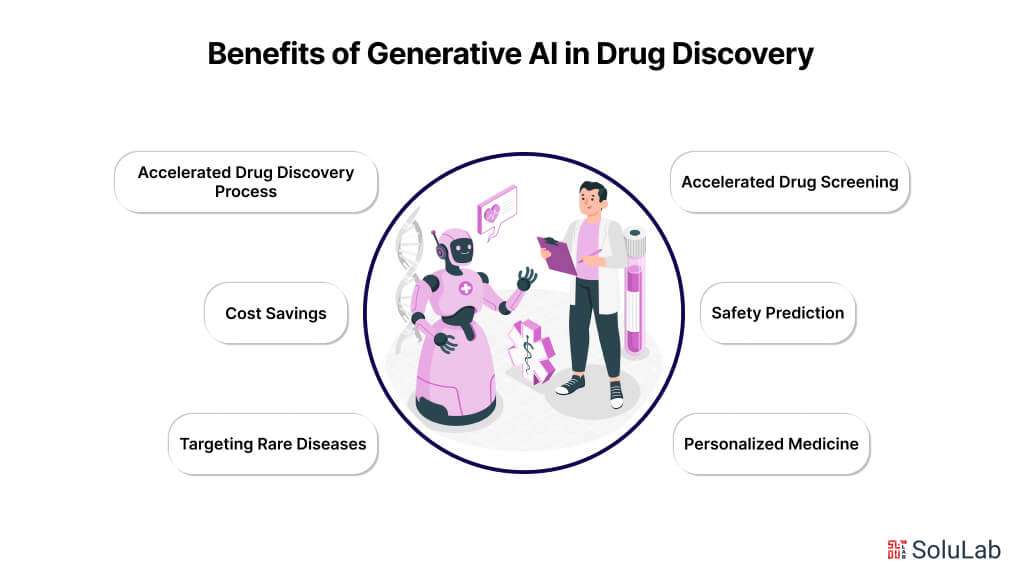
Generative AI systems in drug discovery offer compelling advantages for accelerating the process of identifying potential medications. By swiftly exploring a vast chemical space, these systems streamline the journey from initial discovery to clinical trials, significantly reducing the time required for drug development. Have a look at some of the great benefits of generative AI in drug discovery.
- Accelerated Drug Discovery Process: Generative AI systems in drug discovery expedite the exploration of a vast chemical space, drastically reducing the time needed to identify potential drug candidates. Researchers can swiftly analyze numerous compounds, expediting the entire drug development pipeline from initial discovery to clinical trials.
- Cost Savings: Generative AI significantly reduces the high costs associated with traditional drug discovery methods by minimizing reliance on expensive laboratory work and increasing the likelihood of identifying successful drug candidates. This leads to substantial cost savings throughout the research and development phases, making drug discovery more economically viable.
- Targeting Rare Diseases: Generative AI leverages existing datasets to propose therapeutic molecules for rare diseases with limited data, offering new avenues of hope for patients. By expanding the scope of drug discovery, this technology fosters innovation and exploration in treatment development for previously overlooked or understudied conditions.
- Personalized Medicine: Generative AI tailors treatments to individual patients based on their unique genetic makeup, optimizing treatment efficacy and minimizing adverse reactions. This personalized approach transforms healthcare by focusing on individual patient needs and improving overall patient outcomes.
- Accelerated Drug Screening: Generative AI swiftly analyzes extensive datasets of chemical compounds and their interactions with biological targets, expediting the early stages of drug discovery. This efficiency allows researchers to focus on the most promising compounds, ultimately speeding up the drug discovery process.
- Safety Prediction: Generative AI accurately forecasts potential side effects and toxicity early in the drug discovery process, prioritizing drug candidates with improved safety profiles. By identifying problematic compounds and optimizing molecules, this technology creates safer and more effective medications, reducing the risk of adverse events in clinical trials and post-market use.
Read Blog: Generative AI in Healthcare
Factors Influencing Generative AI’s Increasing Importance in Drug Discovery
The use of generative AI for drug discovery is being driven by the following factors:
1. Growing Complexity of Drug Development: As our understanding of illnesses at the molecular level has improved, so too has the complexity of the drug discovery process. By sorting through enormous information, seeing subtle trends, and producing novel compounds or treatment possibilities catered to certain targets, generative AI may manage this complexity. This streamlines and quickens the process of finding new drugs.
2. Big Data and Molecular Information Availability: A rich supply of data for training and verifying Generative AI models is made possible by the accessibility of large datasets including details on chemical structures, biological tests, genomics, and other topics. AI systems can find more successful treatment candidates by using this data to generate more accurate and well-informed recommendations.
3. Support and Acknowledgment From Regulators: Regulators are becoming more aware of the possibilities presented by AI-driven technologies for drug development. The confidence to use these technologies is increased when regulatory agencies offer assistance and direction for integrating generative AI in the drug development process. This acknowledgment guarantees that the industry when using generative AI for drug research, may successfully handle regulatory hurdles.
4. Unmet Medical Needs: Generative AI has the ability to find medication candidates for illnesses for which there are no reliable therapies, thereby filling a gap in the medical field. Interest in and funding for generative AI are heavily influenced by its potential to dramatically affect patient outcomes. Patients with diseases that were thought to be difficult to cure before now have hope.
What are the Challenges in Drug Development Posed by Generative AI?
Even with their enormous promise, generative AI technologies still face a number of obstacles that must be overcome before they can be effectively included in drug discovery processes.
Training big, high-quality, varied datasets is necessary for generative models. Experimental data used in drug development is frequently noisy, sparse, and prone to mistakes and outliers. It is still difficult to obtain substantial amounts of high-quality data, particularly for uncommon illnesses or new therapeutic targets.
Unrealistic or skewed results may be produced by generative models that were trained on biased or small datasets. Therefore, it is essential to make sure that these models are generalized over the large chemical space and biological targets, and that they are trained on impartial, varied datasets. Significant ethical and legal questions are brought up by these technologies, particularly those pertaining to patient safety, data privacy, and intellectual property rights.
Most significantly, and lastly, generative models are by nature opaque, which begs further problems concerning their interpretability and explainability. Notwithstanding these difficulties, generative AI holds promise for launching a new wave of AI-driven medication development.
Conclusion
There has been an enormous conceptual change brought about by the integration of generative AI in drug discovery. It provides enhanced speed, efficiency, and intelligence. The quality and potential success of therapeutic candidates are improved by the use of generative AI in the creation of new compounds, target identification, and optimization. It also makes decision-making throughout the discovery process more data-driven and is positioned to be crucial in the continuous search for novel and efficient pharmaceuticals.
A more data-centric and knowledgeable approach to decision-making is made possible by generative AI for drug research. It offers a way to search through enormous databases for trends, correlations, and possible links that would not have been visible throughout the course of drug development. This expanded field of investigation may reveal novel therapy avenues and tackle difficult medical problems. The pharmaceutical sector is positioned to be a key player in the pursuit of novel and efficient pharmaceutical solutions as long as it continues to use generative AI.
SoluLab plays a pivotal role in advancing the field of Generative AI through its expertise in software development and data science. As a leading Generative AI development company, SoluLab collaborates with clients across various industries to harness the power of Generative AI for innovative solutions. By partnering with SoluLab, organizations gain access to innovative generative AI tools that drive efficiency, foster innovation, and ultimately contribute to improving patient outcomes in the healthcare industry. Contact SoluLab today to explore how our expertise in generative AI can transform your drug discovery efforts and propel your organization forward.
FAQs
1. What is Generative AI, and how does it apply to drug discovery?
Generative AI refers to a branch of artificial intelligence focused on creating new content, such as images, text, or molecules, based on patterns learned from existing data. In drug discovery, Generative AI algorithms analyze vast datasets of molecular structures and biological targets to propose novel drug candidates, optimize existing compounds, and predict therapeutic properties with precision.
2. How does Generative AI accelerate the drug discovery process?
Generative AI expedites drug discovery by rapidly exploring a vast chemical space, reducing the time required to identify potential drug candidates. Through advanced algorithms and machine learning techniques, Generative AI enables researchers to efficiently analyze numerous compounds, streamlining the transition from initial discovery to clinical trials and ultimately speeding up the entire drug development pipeline.
3. What are the benefits of using Generative AI in drug discovery?
The benefits of Generative AI in drug discovery are manifold. This technology significantly reduces costs associated with traditional laboratory experiments by minimizing reliance on expensive physical testing. Moreover, Generative AI enhances the likelihood of identifying successful drug candidates, leading to substantial cost savings throughout the research and development phases. Additionally, Generative AI enables personalized medicine by tailoring treatments to individual patients based on their unique genetic makeup, optimizing treatment efficacy, and improving patient outcomes.
4. How does SoluLab contribute to the implementation of Generative AI in drug discovery?
As a leading Generative AI Development Company, SoluLab specializes in crafting custom AI solutions tailored to the specific needs of drug discovery projects. With a team of skilled AI developers and data scientists, SoluLab collaborates closely with pharmaceutical companies and research institutions to harness the power of Generative AI. From accelerating drug screening processes to enhancing safety prediction and personalized medicine initiatives, SoluLab’s Generative AI solutions drive innovation and efficiency in the pharmaceutical industry.
5. What are some real-world applications of Generative AI in drug discovery?
Generative AI has numerous applications in drug discovery, including accelerated drug screening, safety prediction, and personalized medicine. By swiftly analyzing extensive datasets of chemical compounds and their interactions with biological targets, Generative AI expedites the identification of potential drug candidates and enhances the efficiency of early-stage drug discovery. Additionally, Generative AI accurately forecasts potential side effects and toxicity, prioritizing drug candidates with improved safety profiles and ultimately creating safer and more effective medications.



